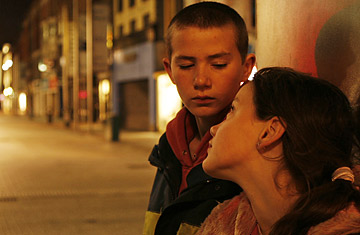
A scene from the movie Kisses directed by Lance Daly
Near Dublin, Dylan (Shane Curry) and Kylie (Kelly O'Neill), the young protagonists of the bittersweet Irish film Kisses, share in the mysterious, powerless business of being eleven. They are both outside the safety zone of an easy childhood. Dylan lives with a downcast mother and a father (Paul Roe) abusive enough to have previously scared off his older brother Barry. Right next door — indeed, close enough to hear every harsh word — Kylie lives with a pack of siblings and a mother too worn to notice that her own brother has an unnatural interest in getting kisses, and more, from his young niece.
At the point we meet the children, on a gloomy day during the Christmas holiday — shot in black and white to fine arty effect by writer/director Lance Daly — Dylan has no particular use for Kylie. She's a mouthy pest who likes to provoke, and he's a friendless kid whose natural tendency is to retreat, whether into the tiny screen of his computer game or into a closet where his father might not notice him. But in the course of the film, Dylan and Kylie become, perhaps only briefly, each other's saviors. As a portrait of united adolescents, Kisses is reminiscent of 2002's Raising Victor Vargas, but whereas that movie conjured up the essence of a sensual, sweaty New York summer, this one is filled with the chilly grit of urban Ireland. In its sweetness, beauty and brevity (the running length is only 72 minutes), Kisses plays like a younger version of the breakthrough Oscar-winning Once.
Kylie is hiding from her creepy uncle when pandemonium breaks out next door: Dylan has drawn his father's ire by intervening in the beating of his mother. In a lovely reversal of the prince rescuing the princess from a castle tower, Kylie throws up a ladder and offers Dylan a means of escape. They run off together, and as they reach the banks of a decidedly non-pastoral river, Daly begins to brighten the film, adding pink to Kylie's sweater and blue to the water. She's emboldened by her rescue and takes a daring leap onto the deck of a dredger and directs Dylan to follow.
The scenes that follow are filled with a glee that comes from the child's taste of a life unhindered by parental control. The recent immigrant driving the boat is unexpectedly kind and warm — upon being introduced to Dylan, he takes out a harmonica to teach them about the pleasures of Bob Dylan. There's a vague sense of disbelief for the viewer, watching this happy boat trip to Dublin; what are the chances of runaway children being ferried by such an amiable soul? But Daly isn't sending his subjects into a fantasyland. There will be plenty of time for harsh reality to intrude later. The easy glory of the boat trip serves to seduce the children into continuing on their journey away from the awfulness of home. Their goal, such as it is, is to track down the missing brother, Barry, who when last the family had heard from him was living in a squat somewhere near the Liffey.
In Dublin, Daly turns the color on full throttle — arguably a simplistic choice, but one that captures the excitement and possibilities of a city at night. He also jacks up the Dylan-centric soundtrack. The kids even encounter a very plausible Dylan impersonator (Stephen Rea) in an alley outside a nightclub. In their innocence, they never question whether he's the real deal, and the scene is filled with the drollness of their self-satisfaction in meeting a famous person — even though that very morning they had no idea who Bob Dylan was. That's the thing about these kids, we admire their bravery — which they come to very much need during the course of the night — but also their deficiencies, their brattiness, how unformed they still are. In short, we come to love them as children.
Neither O'Neill nor Curry, both 11 at the time of filming, have acted before and certainly that adds to their naturalism. They aren't unduly cute or mature — these are not miniature movie stars, but rather kids who might have stumbled out of any Irish home. (Bless whomever it was who opted to put subtitles on some of the scenes where their accents and the normal mumble of an adolescent coalesce into incomprehensibility.) Who knows if they will continue to make movies, although O'Neill's on camera presence in particular suggests we'll be seeing more of her. Either way, in Kisses they have a small celluloid treasure of youth to hold onto. And so do we.
